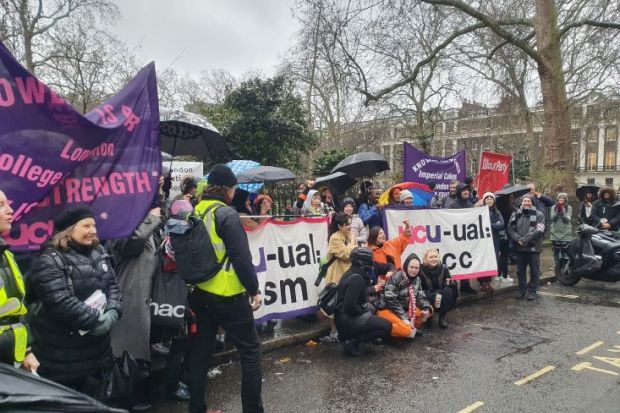UK union members at picket lines and rallies, on strike for the second time this academic year, have spoken of their “grim determination” to get employers to listen to their demands.
On the picket at SOAS University of London, Johnny Darlington, the University and College Union branch secretary, said that even though members knew they would lose 14 days of pay “this is so important that they are willing to make that sacrifice”.
“The union members are resolved; it’s a sense of grim determination,” he said. The increasing casualisation of staff, combined with the proposed changes to pensions had “made people very angry”, he added.
At a rally outside the headquarters of Universities UK and the Universities and Colleges Employers Association, Roddy Slorach, a senior disability adviser at Imperial College London, said that the intransigence of employers had made members “really really upset”.
“The point for us is that there has been a long-term deterioration in our higher education system,” he said. Universities are falling victim to the marketisation of higher education and people are taking a stand now “as a warning for the future”, he added.
Regarding the pensions dispute, which also saw UCU members at Imperial and other universities across the UK take industrial action in 2018, Mr Slorach said “people feel it is unfinished business” and echoed the phrase “grim determination” to describe the feelings at his institution.
“The fact that we’ve been here before and we’re here again shows it is something important,” he said.
Also at the rain-soaked rally outside Woburn House, a union representative from the University of the Arts London spoke of anger that universities were framing the strikes as a dispute over money. “They tell students it’s just about pay, but we’re not academics who are trying to bleed the university dry; we’re academics who deserve respect and advocacy.
“It’s disappointing,” she continued. “At UAL, there are more casualised members of staff than there are permanent staff…and a lot of our universities are not doing enough to close the gender and ethnic minority pay gap. We’ve just had enough.”
She added that the inclusion of an additional 14 UCU branches in the strikes showed that the situation was “escalating” rather than fading.
Sam, a lecturer at UAL, agreed that the overall feeling of decline was pushing people on to the picket lines. “All of the four issues [pay, workload, equality and casualisation] affect us…The changes are very real and tangible. You are aware of the changes each year, but they amount to a significant shift in what is seen as normal, but it is a deterioration – of the circumstances our lecturers work in and our students learn in,” he said.
He said that it was difficult on a local level to know where the blame lay, because UAL had made significant statements on some issues, and had “positioned itself as a victim of the wider culture”.
This was echoed by Manjeet Ramgotra, a lecturer in political theory at SOAS, who said that it did seem that management understood “that the situation is really hard. They are under pressure too, there is no money” and added that they seemed “stuck in the middle” when it came to pensions provided by the Universities Superannuation Scheme.
However, she said that she and others could not forgive the attitude towards casualisation and gender and ethnicity pay gaps, especially when the “managerial class” was paid so highly.
“It’s in their interest to have cheap labour,” Dr Ramgotra said. “I was a senior teaching fellow on a very low-paid part-time teaching contract. When you are in the cycle of teaching and making ends meet, it leaves no time for research.”
She added: “There is a lot of anxiety and a lot of disappointment.”
Register to continue
Why register?
- Registration is free and only takes a moment
- Once registered, you can read 3 articles a month
- Sign up for our newsletter
Subscribe
Or subscribe for unlimited access to:
- Unlimited access to news, views, insights & reviews
- Digital editions
- Digital access to THE’s university and college rankings analysis
Already registered or a current subscriber? Login







